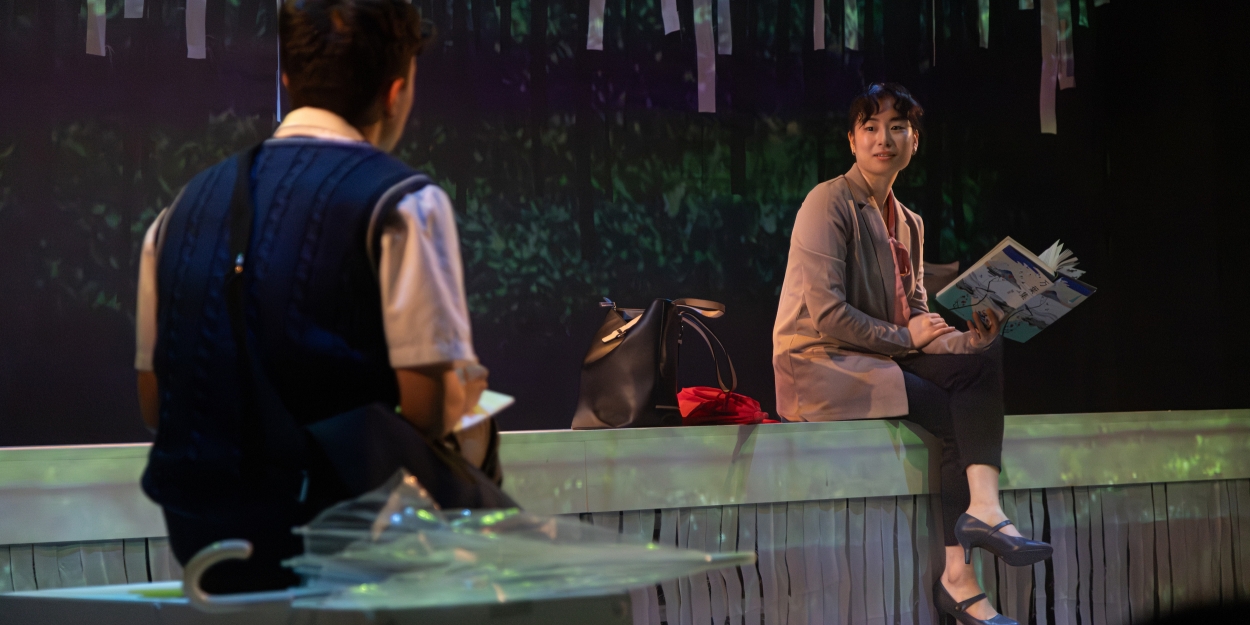Review: THE GARDEN OF WORDS, Park Theatre
Play adapted from anime movie does not quite land on stage

 The anime vibe is present as you take your seat - the saturated colour palette of the video projected on stage, the rain sheeting down, the skyscrapers of Tokyo looming. Soon teenagers arrive, confused about the transition to adulthood already underway and then the grown-ups, lost and alienated in a world that seems always at arm’s length as they plot a future that is wracked with anxiety. Yes, there’s a bit of Murakami in there too.
The anime vibe is present as you take your seat - the saturated colour palette of the video projected on stage, the rain sheeting down, the skyscrapers of Tokyo looming. Soon teenagers arrive, confused about the transition to adulthood already underway and then the grown-ups, lost and alienated in a world that seems always at arm’s length as they plot a future that is wracked with anxiety. Yes, there’s a bit of Murakami in there too.
Director, Alexandra Rutter’s, The Garden of Words is adapted from a movie, becoming part of a burgeoning trend of taking an art form that started in graphic novels that moved first to the screen and is now moving to the stage.
The genre (as anyone who has seen a Studio Ghibli film can attest) is at once familiar, but also disorienting, ideas about heroes and villains embedded in the Western tradition subverted (from our perspective) and complex moral questions left without traditional glib solutions. Sometimes that structural ambiguity can be satisfying, and sometimes infuriating - there’s a bit of both in this play.
Takao (Hiroki Berrecloth, impressive on his stage debut) dreams only of designing shoes, his ticket out of a home with a boozed-up, largely absent mother and a brother rushing out to live with his girlfriend - it’s a bit Kinky Boots. Avoiding school, he finds his way to a peaceful garden where a woman, Yukari (Aki Nakagawa), ten years or so his senior, reads enigmatic Japanese poetry, while swigging beer and eating chocolate. The two oddball loners hit it off, with the boy infatuated with the mysterious mother-figure and the woman intrigued by a kid in whom she sees much of her own isolation.
Meanwhile, a girl at school (Shoko Ito) is discovering make-up, short skirts and a capacity to turn boys’ heads, inevitably falling for a controlling jock who ruthlessly exploits her lack of self-esteem. When she eventually realises his true nature, she turns on the mysterious woman in a fit of jealousy who, it is revealed, is a teacher about whom rumours are circulating. The mess leads to false accusations and a showdown with Takao.
None of this is particularly clear in a narrative that slips and slides and I’m not at all sure that summary is correct in all details. This is partly because adaptors (Susan Momoko Hingley joining the director) have expanded some of the minor roles from the film and the storylines never quite gel into a coherent whole. Shoko is too much of a cypher for the bad girl (smoking cigarettes!) and we’re not entirely clear how she is so motivated to bring down Yukari to the extent of ruining her, nor how the school fails to see how troubled a teen she is and offer support.
The best elements of the show are KENNY’s video work and Nicola T. Chang’s sound design creating an otherness that sends us to another place without losing its connection with the real world. Hang on to that while marrying it to an engagement with characters as fully realised as Takao and Yukari (the supporting cast have a thankless task with underwritten roles) and a more clear approach to the plotting and the play would succeed beautifully.
As it stands, it’s gorgeous to look at, but the garden’s magical haven remains too inaccessible for us on the other side of the fourth wall.
The Garden Of Words at Park Theatre until 9 September
Photo Credit: Piers Foley
Reader Reviews
Videos

